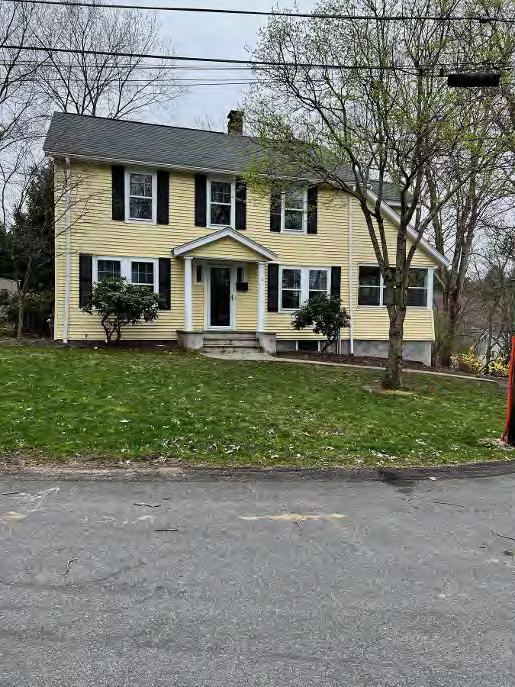

TheHome BuyingProcess
Your GuidetoPurchasingProperty
PRESENTED BY
MOLLY CAMPBELL PALMER VICE PRESIDENT
PREPARED FOR SHENG

TheBuyingProcess
A
brief overview of what to expect from home search preparation to closing day.
ThePreparation

- Calculate your maximum affordable price,including down payment,closing costs,and monthly mortgage payments
- Contact lenders to compare rates and terms; obtain a pre-approval letter stating the loan amount you qualify for
- Determine your must-haves and preferences for the property.
- Consider location,size,style,and amenities.
TheSearch
- Attend open houses.View online listings on real estate websites and utilize your real estate agent to schedule private showings
- Leverage your agent's expertise to assess and find potential properties (ie off market,?coming soon?)
TheOffer
- Work with your agent to craft a competitive offer.
- Consider all elements: price,terms,contingencies,dates,inclusions and exclusions.
- Submit the offer to the seller with an earnest money deposit.
- Be prepared for counter offers and negotiation.
ThePurchase& SaleAgreement
- Engage a real estate attorney to advise on the terms and language of the purchase and sale agreement
- Negotiate language via your attorney to arrive at a mutually agreeable contract.
- Sign agreement and submit additional deposit (typically 5% of purchase price).
TheClosingPreparation
- Finalize your mortgage application.Provide any additional documentation requested by the lender.
- Wait for loan approval and commitment letter.
- Arrange utilities at new property,forward mail,contact service providers,coordinate movers,arrange homeowners insurance.
- Review closing costs and loan documents with your attorney.
CompleteaFinalWalkthrough
- Inspect the property one last time to ensure it's in the agreed-upon condition.
- Confirm that any negotiated repairs have been completed.
- Check for agreed upon inclusions and exclusions and any furniture that was purchased from sellers.
AttendTheClosing
- Bring a valid ID,funds for closing costs,and any required paperwork to the closing.
- Sign all necessary documents.
- Receive the keys to your new home.
MoveInandEnjoyYourHome!

2025 YeartoDate
WELLESLEY
SINGLE-FAMILY HOMES
Source: MLS Pin
204 Up 17 From 2024 HOME SALES
MEDIAN DAYS ON MARKET
15 Compared to 11in 2024
MEDIAN SALE PRICE
$2,210,651 $45,651Over 2024

NEEDHAM
toDate
SINGLE-FAMILY HOMES
Source: MLS Pin
188 Up 23 From 2024 HOME SALES
MEDIAN DAYS ON MARKET
17 Compared to 15 in 2024
MEDIAN SALE PRICE
$1,822,500
$70,480 Over 2024

August 2025 YeartoDate
NATICK
SINGLE-FAMILY HOMES
Source: MLS Pin
209 Up 25 From 2024 HOME SALES
MEDIAN DAYS ON MARKET
18 Compared to 14 in 2024
MEDIAN SALE PRICE
$1,079,000
$133,500 Over 2024

August 2025 YeartoDate
WAYLAND
SINGLE-FAMILY HOMES
Source: MLS Pin
88 Same as 2024 HOME SALES
MEDIAN DAYS ON MARKET
21 Compared to 15 in 2024
MEDIAN SALE PRICE
$1,175,000
$12,500 Over 2024

2025 YeartoDate NEWTON
SINGLE-FAMILY HOMES
Source: MLS Pin
353 Up 4 From 2024 HOME SALES
MEDIAN DAYS ON MARKET
19 Compared to 20 in 2024
MEDIAN SALE PRICE
$1,964,000
$139,000 Over 2024

MollyCampbellPalmer
Vice President
508.269.0002
Molly.Palmer@GibsonSIR.com
54 Central Street
Wellesley,MA02482
Recognized among the top real estate advisors in America by RealTrends in 2025
Recognized among Boston Magazine?s Top Real Estate Producers in 2025 Social Media Influencer of the Year, Boston Agent Magazine, 2025
Molly Campbell Palmer brings proven strategies and a fierce advocacy for her clients to every aspect of the real estate selling and buying process. Having participated in over $500,000,000 of sales in the Wellesley/Weston and Metrowest area, Molly has driven consistent success for her clients in an ultra-competitive environment. By keeping up with the market in real time and providing insider information, Molly is able to offer her clients an unmatched advantage that makes the difference and gets results.
Molly's background in media/advertising and the design industry have uniquely positioned her to help clients buy and sell their homes from a position of knowledge and skill. Her roles at Architectural Digest, Elle Decor, and Design New England have resulted in deep ties to the building and design industry, allowing her to offer a unique and informed approach to every aspect of buying and selling.
Molly brings an unparalleled breadth of collective experience and knowledge to her clients.
TOTAL SALES VOLUME*
$500,000,000
*Participated in TOP 5% OF WELLESLEY AGENTS


Client Testimonials

TOP
5% OF WELLESLEY AGENTS
MollyCampbellPalmer Vice President,REALTOR®
"We are incredibly grateful for the exceptional service Molly has provided throughout the sale of our previous home and the purchase of our new one. From start to finish, Molly demonstrated unmatched professionalism, market expertise, and genuine care for our family's needs. Selling our home could have been a stressful process, but her guidance made it seamless. She prepared us by getting our home ready, provided valuable advice on staging, priced our home perfectly, and her marketing strategy brought in an instant offer. We couldn?t have asked for a better outcome! When it came to finding our new home, Molly was very patient, attentive, and truly listened to what we wanted. Her deep knowledge of the Wellesley market and a keen eye for detail helped us find the perfect house that checked all our boxes. She went above and beyond to make sure the entire process was smooth and worry-free enabling us to close the deal. We highly recommend Molly to anyone looking to buy or sell a home. She made this journey not only successful but also enjoyable. Thank you for helping us with our homes!"
"We met Molly at one of the first open houses we attended. We had already been to 2-3 open houses and frankly did not strike up an instant rapport with the brokers there. They just felt a bit too transactional. That was not the case with Molly. When we met Molly, we spent most of the time talking about how the school system works in Wellesley (unchartered territory for us), how/where young families like to spend their time around town,and more family oriented things like that - i.e.the stuff that REALLY matters. After that first convo, Molly was clearly the person we trusted and felt comfortable going back to as we navigated this whole home buying process. Fast forward to finding and purchasing the home we currently live in...none of this incredible happy ending would have been possible without Molly. Molly knows everyone in town, which helped us get in contention for this home in the first place. Not easy to do in a town that's in high demand 365 days out of the year. From there, Molly helped us craft an offer and did some serious (and needed) hand holding through every step of the negotiation that led to our offer being accepted. We're in the perfect home for our soon-to-be family in the perfect town, and none of it would have been possible without Molly. Molly if you're reading this...thank you from the bottom of our hearts."
"I met Molly at an open house, and she became a trusted resource for over a year while we prepared to sell our home. We met with a number of realtors, and ultimately chose to list with Molly because of her expertise, dedication, and candor. Throughout the selling process, Molly made us feel as though we were her highest priority, was always available for the biggest or smallest of questions or crises, and had the resources at her fingertips to address unexpected issues efficiently. Molly was a competent, reassuring presence throughout, and we ultimately ended up with multiple offers over asking (which Molly navigated expertly).Can't speak highly enough of Molly and her work!"
"Working with Molly was a pleasure.We were impressed by how much she listened to our wishlist and (very) proactively brought us new listings to consider. Her communication was second to none and she always made herself available for our texts/calls and to tour homes. Most importantly, Molly was honest and shared her insights and knowledge with us at every step of the process. We felt like we could fully trust Molly and would definitely work with her again!"
Client Testimonials

TOP
5% OF WELLESLEY AGENTS
MollyCampbellPalmer Vice President,REALTOR®
"Molly was excellent to work with when buying our first house and we highly recommend her as a realtor. She listened to what we were looking for, quickly responded when we reached out with questions, was resourceful in finding answers, and pushed hard for our best interests when things didn?t go as planned.The home buying process went smoother thanks to Molly?s help!"
"We had the pleasure of working with Molly as we searched for our forever home in the suburbs and couldn?t be more grateful for her expert help and guidance. In a challenging and competitive market for buyers, Molly made the process of finding our home easy and stress-free. One of her strengths is her in-depth knowledge of the communities she works in. She frequently would send us information on homes that were about to list as well as off-market listings, and would always have helpful intel and perspective to share. I was particularly impressed by the care she took to really understand what we were looking for and what was important to us in our future home. We never once felt pressured (or defeated!) during the buying process ? Molly was a constant calming and reassuring presence that our perfect home was out there waiting to be found. Simply put, Molly is the best! We would highly recommend her anyone looking to buy or sell a property."
"Molly is an extremely bright and knowledgeable real estate professional! She has a unique skill of balancing the vast emotions of buying a house with real time information and solutions. It starts with her complete understanding of the market in metro west including new and existing homes. Her attention to detail, note taking and follow up is second to none! Her energizing personality turns tasks into fun! She has a genuine passion for residential real estate, home décor and architecture with a diverse background of experiences. Molly is a hustler yet does not yield from honesty and integrity. Her tenacious attitude and problem-solving skills became vitally important in solving various obstacles along the home purchase journey. We have owned 12 homes in our adult lives and Molly is ? without a doubt ? the best realtor we have ever worked with, and we highly recommend her!"
"Molly helped us buy our house this Spring of 2022. If you're familiar with this market, you know that is no small feat. We were at the "entry" price point in some neighborhoods that we wanted to live in which makes competition tough.Molly never once pressured us to live somewhere we didn't want tothis is a big deal because she trusted that we knew our wants/needs and that we would indeed find our house. We began looking in February 2022 and were under contract in May in a neighborhood I didn't think we could afford. We ended up buying from some particularly difficult sellers, and there were several times I questioned if we'd actually get the house. Molly was always calm and professional, and knew when to involve outside counsel for matters outside her purview. She was undoubtedly instrumental in getting us to the finish line! Finding your house in this market takes a lot of persistence/patience, a little luck, and a well-connected, knowledgeable, trustworthy, and kind realtor. Molly was all of that and more. I whole-heartedly recommend her to anyone looking to buy or sell,and will be referring her to any colleagues/friends moving forward."
10 Ingersoll Road, Wellesley
Sold for $3,150,000 | Represented Buyers


47 Cypress Road, Wellesley Sold for $3,000,000 | Represented Buyers


34 Chesterton Road, Wellesley Sold for $3,025,000 | Represented Buyers

39

12 Pheasant Landing Road, Needham
Sold for $2,545,000 Represented Sellers
21Washburn Avenue, Wellesley Sold for $2,431,000 Represented Sellers
| Represented Buyers

15 Swarthmore Road, Wellesley Sold for $2,400,000 Represented Buyers
Sagamore Road, Wellesley Sold for $2,600,000






68 Oakland Avenue, Needham Sold for $2,365,000 | Represented Buyers
71 Suffolk Road, Wellesley Sold for $2,275,000 | Represented Buyers
12 Pheasant Landing Road, Needham Sold for $2,150,500 | Represented Buyers
109 Suffolk Road, Wellesley Sold for $2,107,500 | Represented Buyers
110 Suffolk Road, Wellesley Sold for $1,940,000 | Represented Buyers
81Bristol Road, Wellesley Sold for $1,667,800 | Represented Buyers
350 First Parish Road, Scituate Sold for $1,500,000 | Represented Buyers


410 School Street, Wellesley Sold for $1,445,000 | Represented Sellers

6 Saunders Terrace, Wellesley Sold for $1,500,000 | Representing Buyers
17 Roberts Road, Wellesley

Sold for $1,375,000 | Represented Sellers

31Bancroft Road, Wellesley Sold for $1,300,000 Represented Buyers

70 Sherburn Circle, Weston Sold for $1,425,000 | Represented Sellers
8 Vista Road, Wellesley Sold for $1,300,000 | Represented Buyers


432 Weston Road, Wellesley Sold for $1,285,000 Represented Buyers

40 Rolling Lane, Dover Sold for $1,250,000 Represented Buyers
8 Selden Street, Newton
Sold for $1,200,000 | Represented Buyers

17 Upwey Road, Wellesley
Sold for $1,200,000 | Represented Sellers

65

Sold for $1,000,000 | Represented Sellers

80
Sold for $840,000 | Represented Sellers

65
Sold for $755,000 | Representing Buyers

2
Sold for $870,000 | Represented Buyers

82
Sold for $790,000 | Represented Sellers

Sold for $751,000 | Represented Buyer
Sexton Avenue, Westwood
Sexton Avenue, Westwood
Ivy Lane, Ashland
Tisdale Drive, Dover
Lasalle Avenue, Framingham
38 Grove Street, Norfolk
Needham Town Map


Needham Junction Hersey
3. Pollard Middle School
4. High Rock Middle School
5. Needham High School
6. Broadmeadow Elementary School
7. Eliot Elementary School
8. Mitchell Elementary School
9. Newman Elementary School
10. Sunita L. Williams Elementary School
11. Grace Preparatory Academy
12. Saint Joseph School
13. St. Sebastian's School Route 9 Interstate 95 Great Plain Avenue Highland Avenue Chestnut Street Central Avenue Dedham Avenue/Route 135

Molly Campbell Palmer Vice President

Wellesley Town Map


Katharine Lee Bates Elementary School
Upham Elementary School
Owner of Record
TO (Seller and Spouse)
OFFER TO PURCHASE REAL ESTATE
Date:
From the Office of :
Molly Campbell Palmer
The property herein referred to is identified as follows:
Gibson Sotheby's International Realty 54 Central Street, Wellesley all buildings named and numbered XXXX, and all land approximately XXXX square feet.
Special provisions (if any) re fixtures, appliances, etc.
hereby offer to buy said property, which has been offered to me by as the Broker(s) under the following terms and conditions: CHECK ONE:
1. I will pay therefore $ , of which Check, subject to collection (a) $ is paid herewith as a deposit to bind this Offer Cash (b) $ is to be paid as an additional deposit upon the execution of the Purchase and Sale Agreement provided for below. (c) $ is to be paid at the time of delivery of the Deed in cash, or by certified, cashier’s, treasurer’s or bank check(s). (d) $
(e) $ Total Purchase Price
2. By accepting this Offer, you agree to pay my broker, _______________________, who is representing me and acting as my agent, a fee equal to ____________________________, which fee is included in the purchase price and shall be paid from the proceeds of the sale at the time of closing.
3. This Offer is good until A.M. P.M. on , 20 at or before which time a copy hereof shall be signed by you, the Seller and your (husband) (wife), signifying acceptance of this Offer, and returned to me forthwith, otherwise this Offer shall be considered as rejected and the money deposited herewith shall be returned to me forthwith.
4. The parties hereto shall, on or before A.M. P.M. , 20 execute the applicable Standard Form Purchase and Sale Agreement recommended by the Greater Boston Real Estate Board or any form substantially similar thereto, which, when executed, shall be the agreement between the parties hereto.
5. A good and sufficient Deed, conveying a good and clear record and marketable title shall be delivered at 12:00 Noon on , 20 at the appropriate Registry of Deeds, unless some other time and place are mutually agreed upon in writing.
6. If I do not fulfill my obligations under this Offer, the above mentioned deposit shall forthwith become your property without recourse to either party. Said deposit shall be held by as escrow agent subject to the terms hereof provided however that in the event of any disagreement between the parties, the escrow agent may retain said deposit pending instructions mutually given in writing by the parties. A similar provision shall be included in the Purchase and Sale Agreement with respect to any deposit held under its terms.
7. Time is of the essence hereof.
8. Disclosures: For one to four family residences, the Buyer hereby acknowledges receipt of the Home Inspectors: Facts for Consumers brochure produced by the Office of Consumer Affairs. For residential property constructed prior to 1978, Buyer must also sign Lead Paint “Property Transfer Notification.”
9. The initialed riders, if any, attached hereto are incorporated herein by reference. Additional terms and conditions, if any:

NOTICE: This is a legal document that creates binding obligations. If not understood, consult an attorney. WITNESS MY HAND AND SEAL
Buyer Buyer
Address/City/State/Zip
Phone Numbers (Work & Home)
Receipt of deposit check for transmittal by: (Agent/Facilitator) Check shall not be deposited unless offer is accepted. This Offer is hereby accepted upon the foregoing terms and conditions at A.M. / P.M. on , 20 WITNESS my (our) hand(s) and seal(s)
Seller (or spouse)
Date
Seller
RECEIPT FOR DEPOSIT
Received from Buyer the sum of $ as deposit under the terms and conditions of above Offer, to be held by as escrow agent.
Under regulations adopted pursuant to the Massachusetts license law: All offers submitted to brokers or salespeople to purchase real property that they have a right to sell shall be conveyed forthwith to the owner of such real property.
Agent for Seller
OFFER TO PURCHASE CONTINGENCY ADDENDUM
The BUYER, if checked, hereby incorporates the following contingencies into this Offer to Purchase Real Estate.
MORTGAGE CONTINGENCY
In order to help finance the acquisition of the property, the BUYER shall apply for a conventional bank or other institutional mortgage loan of $ ___________________ at prevailing rates, terms and conditions. If despite the BUYER’s diligent efforts a commitment for such loan cannot be obtained on or before _____________, 20____, then the BUYER shall have the option of revoking this agreement by written notice to the SELLER and/or the Broker representing the SELLER prior to the expiration of such time, whereupon all deposits made by the BUYER shall be forthwith refunded, and this agreement shall become null and void and without further recourse to either party. In no event will the BUYER be deemed to have used diligent efforts to obtain such commitment unless the BUYER submits a complete mortgage loan application conforming to the foregoing provisions on or before _______________, 20____.
INSPECTION CONTINGENCY
The BUYER may, at the BUYER’s own expense and on or before _________________, 20____, have the property inspected by a duly-licensed person engaged in the business of conducting home inspections. If it is the opinion of such inspector that the property contains serious structural, mechanical or other defects and if the repair of such defects would cost the BUYER in the aggregate more than $___________________, then the BUYER shall have the option of revoking the agreement by written notice to the SELLER and/or Broker representing the SELLER on or before ________________, 20____. Such notice shall be accompanied by a copy of the inspector’s opinion and cost estimates.
RADON CONTINGENCY
The BUYER may, at the BUYER’s own expense and on or before ________________, 20__, have the property inspected for the presence of radon gas. In the event a customary test for the presence of radon gas indicates the presence of radon gas in excess of levels deemed acceptable by the federal Environmental Protection Agency, then the BUYER shall have the option of revoking the agreement by written notice to the SELLER and/or Broker representing the SELLER on or before ________________, 20____. Such notice shall be accompanied by a copy of the test results.
PEST INSPECTION CONTINGENCY
The BUYER may, at the BUYER’s own expense on or before ______________, 20____, have the property inspected by a person engaged in the business of pest inspection and control. If it is the opinion of such inspector that the property is infested by termites or other wood boring pests, then the BUYER shall have the option of revoking this agreement by written notice to the SELLER and/or the Broker representing the SELLER on or before _______________, 20___. Such notice shall be accompanied by a copy of the inspector’s opinion and any related inspection report.
LEAD PAINT CONTINGENCY ADDENDUM
The BUYER may, at the BUYER’s own expense and within ten (10) days after the acceptance of this agreement, have the property professionally inspected for the presence of paint, plaster or other accessible materials containing dangerous levels of lead (as such terms are defined by applicable Massachusetts laws and regulations). A copy of the inspector’s report shall be furnished to the SELLER upon receipt by the BUYER. If it is the opinion of such inspector that any such materials are present on the property, then the BUYER shall have the option of revoking this agreement by written notice to the SELLER and/or the Broker representing the SELLER prior to the expiration of such time.
In the event the BUYER revokes the agreement consistent with the terms of the above selected Contingencies, then any deposits made by the BUYER shall be forthwith refunded, and this agreement shall be null and void and without further recourse to either party.

ExclusiveBuyerRepresentationAgreement
Buyer’sName:_________________________________________________(herein“Buyer”)
Broker:GibsonSotheby’sInternationalRealty(referredtoas“GibsonSIR”)
Molly Campbell Palmer
Buyer’sAgent:______________________________________________________
BettyGibsonAssociates,Incorporated,doingbusinessasGibsonSotheby’sInternationalRealty(referred toas“GibsonSIR”),theBuyer’sAgentandtheBuyer,inexchangeofmutualpromisesagreeasfollows:
1. PROPERTIES Buyer is retaining Gibson SIR to be the exclusive Broker representing the Buyer in the purchase of real property. The Buyer retains the sole and absolute right to determine if a property is acceptable.
2. TERM This Agreement shall be in effect from the date of signing through ________________________________________or to completion of the Acquisition of the property, if under agreement, whichever is later (the “Term”). The Buyer’s obligation to pay the compensation will continue for a 90-day period after the expiration of the Term of this Agreement for properties introduced and shown by the Buyer’s Agent during the Term.
6 months from date of signing
3. GIBSON SIR AGREES TO:
● Prepare a wants/needs list for the Buyer.
● Use reasonable efforts to locate properties acceptable to the Buyer through the Multiple Listing Service (MLS) and off MLS.
● Work in the Buyer’s best interest and preserve the Buyer’s confidential information.
● Maintain regular communication with the Buyer throughout the term of the Agreement.
● Attend scheduled showings of properties.
● Provide professional advice and guidance to the Buyer.
● Refer the Buyer to professionals such as lenders, attorneys, home inspectors, etc.
● Assist the Buyer in determining the market value of properties of interest.
● Provide a Comparative Market Analysis for properties the Buyer is considering writing offers for, upon the Buyer’s request.
● Assist the Buyer in negotiating terms and conditions of the offer and home inspection issues, if applicable.
4. BUYER AGREES TO:
● Work exclusively with Gibson SIR during the Term and to conduct all real estate purchase negotiations through Gibson SIR and the Buyer’s Agent.
● Cooperate with Gibson SIR by providing necessary personal information to evaluate Buyer’s needs and qualifications.
● Notify any other broker that the Buyer is working with Gibson SIR under the terms of this Agreement.
● Within 7 days of the entering into this Agreement and/ or prior to the Offer to Purchase, the Buyer will provide the Buyer’s Agent a pre-approval from a lender if the Buyer is seeking financing or proof of funds


TheBuyerrepresentsthattheBuyerisnotworkingwithanyotherBuyer’sAgent/Brokerunderthe termsofanExclusiveBuyerRepresentationAgreement.
. COMPENSATION
The Buyer herein acknowledges to being advised that broker commissions are not set by law and are fully negotiable
Prior to showing a property as a buyer representative, a real estate agent who is a REALTOR® must enter into a written agreement with the buyer defining how the real estate broker will be paid.
● The Buyer agrees to pay Gibson SIR compensation for representation in the amount of %of the gross purchase price of any property purchased during the Term of this Agreement.
● The Buyer’s obligation to pay the compensation will be at the time the Buyer purchases the property and takes title.
● No fee will be due under this Agreement if the Buyer does not purchase a property.
● Gibson SIR may not accept Compensation or a fee in excess of the fee agreed in this Agreement.
● A seller or listing agent may offer to pay some, or all of the compensation due to a broker representing a buyer but is under no legal duty to do so.
● The Buyer may, at the Buyer’s option, either (1) seek to have the Compensation paid in whole or in part by the seller in the terms of the offer to purchase and/or (2) pay the Compensation in o e or in part directly to Gibson SIR at closing.
. CONSENT TO DESIGNATED AGENCY
A designated agent is a real estate licensee who has been appointed by a broker or salesperson to represent a buyer as a “designated buyer’s agent” or to represent a seller as a “designated seller’s agent.” When a buyer or seller consents to designated agency only that designated agent represents the buyer or seller. Any other agents affiliated with BROKER may represent another party to the transaction and by consenting to designated agency the buyer or seller permits those agents to represent another party. Individuals who are designated agents owe fiduciary duties to their respective clients. You are further advised that: (a) the designated buyer’s agent will represent the BUYER and will owe the BUYER the duties of loyalty, full disclosure, confidentiality, to account for funds, reasonable care and obedience to lawful instruction; (b) all other licensees affiliated with the appointing BROKER will not represent the BUYER nor will they owe the other duties specified in paragraph (a) to that BUYER, and may potentially represent the seller; and (c) if designated agents affiliated with the same broker represent the seller and buyer in a transaction, the appointing broker shall be a dual agent and neutral as to any conflicting interests of the seller and buyer, but will continue to owe the seller and buyer the duties of confidentiality of material information and to account for funds. By signing this agr . is authorized to represent me as a Designated Agent. I hereby consent to designated agency. If designated agency occurs in a transaction, a notice of designated agency will be given.
7. DISCLAIMER
Gibson SIR is being retained solely as a real estate broker and not as an attorney, lender, appraiser, surveyor, structural engineer, home inspector or other professional service provider. At the Buyer’s request, the Buyer’s Agent may refer the Buyer to such professionals. It is advised for the Buyer to contact Building Departments to inquire about potential open building permits and you are encouraged to speak with people in the Town or City Hall about other questions you may have about

Molly Campbell Palmer (license #9565739)

thecommunity.TheBuyer’sAgentmayworkwithotherbuyersduringtheTermofthisAgreement andwilltreatallbuyerinformationasconfidential.
8. EQUALOPPORTUNITY Thepartiesheretoagreetoabidebyallapplicablefair-housinglaws.
9. MODIFICATIONOFTHISAGREEMENT AnymodificationofthisAgreementmustbein writing,signedanddatedbyallparties.ThisAgreementconstitutestheentireagreementbetweenthe partiesandisacontractsubjecttoMassachusettslaw.Anyprioragreements,whetheroralorwritten, havebeenmergedandincorporatedintothisAgreement.
10. SELLER/LISTINGBROKERTREATMENTOFOFFERS Buyeracknowledgesbeing advisedthatMassachusettslawdoesnotrequiretheSellerorListingBrokertotreattheexistenceof offers,pricetermsorotherconditionsasconfidential.
11. DISPUTES IntheeventthatBuyerandtheGibsonSIRshall,foranyreason,beunabletoresolve adisputearisingfromanyofthetermsofthisAgreement,theneitherpartymaysubmitthematterto bindingarbitrationforthepurposeofresolvingthedispute.
12. OTHERPROVISIONS:____________________________________________________________
This Agreement constitutes a binding Massachusetts Contract. Buyer acknowledges GIBSON SIR’s advice to seek legal counsel relating to any provision of this Agreement if not understood and acknowledges receipt of (a) a copy of this Agreement, (b) a copy of the Massachusetts Mandatory Licensee-Consumer Relationship Disclosure Form, and (c) a brochure entitled “Home Inspector Facts For Consumers.”
Buyer DateBrokerofRecord,LaurenceRideout
Buyer Date
BROKER/SALESPERSONACKNOWLEDGMENTOFDESIGNATEDAGENCY
Iacknowledgeandagreetorepresenttheabovenamedconsumerasadesignatedagentandmysignature belowsignifiesthatIunderstandthedutiesandresponsibilitiesofthatrelationship,andexplainedtothe consumerthatIamatheiragent,togetherwithanyotherlicenseesexpresslyappointedastheir designatedagent;andthattheappointingbrokermaybecomea"dualagent;"andthatnooneelse affiliatedwithmyfirmrepresentsthem.
SignatureofBroker/Salesperson


WIRE POLICY NOTIFICATION FORM
Gibson Sotheby’s International Realty
Wiring $$ to Gibson Sotheby’s International Realty:
This notification is to make individuals working with Gibson Sotheby’s International Realty (herein “Gibson Sotheby’s”) aware of Gibson Sotheby’s policies with respect to funds being wired to Gibson Sotheby’s. This policy is to protect individual buyers and sellers from third-party fraud involving wires. Gibson Sotheby’s will never request that any funds be wired to Gibson Sotheby’s by regular email, text or any other electronic method of communication. Any request for wired funds will only be by verbal communication from the agent or agent team member directly working with that client and will be followed up by written wiring instructions from our secure, encrypted email from – “GSIR Accounting” (NotificationSecureMessage@appriver.com). Upon receiving the email you will need to create a user name and password in order to open up the email. The email will contain our wiring instructions. All wires to Gibson Sotheby’s are only to go to an account under the name of Betty Gibson Associates, Inc. d/b/a Gibson Sotheby’s International Realty – no exceptions!!
Wiring $$ to List agency
(other than Gibson Sotheby’s International Realty):
This notification is to make individuals aware of Gibson Sotheby’s policies with respect to funds being wired to agencies other than Gibson Sotheby’s International Realty. This policy is to protect our clients from third-party fraud involving wires. Gibson Sotheby’s will never initially request that any funds be wired to any other company, or other entity by regular email, text or any other electronic method of communication. Any request for wiring funds to another agency will only be by verbal communication from the agent or agent team member directly working with that client. At that point, the client can confirm the wire instructions of the other agency and their policies designed to protect against fraudulent transactions. A wire should only be sent after confirming the accuracy of the wire instructions.
By executing this form, the undersigned hereby state that they acknowledge this policy and assume all risk of initiating wires that do not comply with the terms of this wiring policy as stated herein.
Signed: _________________________________________ Date: _______ Printed name of person receiving notice:
Signed: _________________________________________
Printed name of person receiving notice:
Date: _______

Commonwealth of Massachusetts
BOARD OF REGISTRATION OF REAL ESTATE BROKERS AND SALESPERSONS
This disclosure is provided to you, the consumer, by the real estate licensee listed in this disclosure.
THE TIME WHEN THE LICENSEE MUST PROVIDE THIS NOTICE TO THE CONSUMER:
All real estate licensees must present this form to you at the first personal meeting with you to discuss a specific residential property. If there is no personal meeting between you and the licensee, this form must be presented electronically or through some other means before the licensee enters into a contract with a consumer. Residential property is defined as land with a building intended for use as a one to four-unit residential dwelling or the purchase or sale of land on which a building is intended to be constructed for use as a oneor two-unit residential dwelling. In the event this relationship changes an additional disclosure must be provided and completed at that time.
CONSUMER INFORMATION AND RESPONSIBILITY:
If you are a buyer or seller, you can engage a licensee to provide advice, assistance and representation to you as your agent. The licensee can represent you as the seller (Seller's Agent) or represent you as the buyer (Buyer's Agent) or can assist you as a Facilitator.
All real estate licensees, regardless of the working relationship with a consumer must, by law, present properties honestly a nd accurately, and disclose known material defects in the real estate.
The duties of a real estate licensee do not relieve consumers of the responsibility to protect their own interests. If you need advice for legal, tax, insurance or land survey matters it is your responsibility to consult a professional in those areas. Real estate licensees do not and cannot perform home, lead paint, or insect inspections, nor do they perform septic system, wetlands or environmental evaluations.
Do not assume that a real estate licensee works solely for you unless you have an agreement for that relationship.
For more detailed definitions and descriptions about real estate relationships, please see page 2 of this disclosure .
THE SELLER OR BUYER RECEIVING THIS DISCLOSURE IS HEREBY ADVISED THAT THE REAL ESTATE LICENSEE NAMED BELOW IS WORKING AS A:
Check one: Seller's agent Buyer's agent Facilitator
If seller’s or buyer’s agent is check ed above, the licensee must complete the following section:
Check one:
The real estate firm or business listed below and all other affiliated agents are also working as the agent of the Seller Buyer
Only the licensee named herein represents the Seller Buyer (designated seller agency or designated buyer agency). In this situation any other agents affiliated with the firm or business listed below do not represent you and may represent another party in your real estate transaction.
By signing below, I, the real estate licensee, acknowledge that this disclosure has been provided to the consumer named herein:
Molly Palmer 9565239
Broker
Salesperson Signature of Licensee Printed name of Licensee License #
http://www.mass.gov/ocabr/licensee/dpl-boards/re/ MASSACHUSETTS MANDATORY LICENSEE-CONSUMER RELATIONSHIP DISCLOSURE THIS IS NOT A CONTRACT Designated Agency Gibson Sotheby's Int'l Realty 1611
Date Name Real Estate Brokerage Firm Brokerage Firm License #
Buyer Seller Signature of consumer Printed name of consumer
Signature of consumer Printed name of consumer
Check here if the consumer declines to sign this notice.
SELLER'S AGENT
A seller can engage the services of a real estate licensee to act as the seller’s agent in the sale of the seller’s property. This means that the real estate agent represents the seller, who is a client. The agent owes the seller client undivided loyalty, reasonable care, disclosure, obedience to lawful instruction, confidentiality and accounting. The agent must put the seller's interests first and attempt to negotiate price and terms acceptable to their seller client. The seller may authorize sub-agents to represent him/her in marketing its property to buyers, however the seller should be aware that wrongful action by the real estate agent or sub-agents may subject the seller to legal liability for those wrongful actions.
BUYER'S AGENT
A buyer can engage the services of a real estate licensee to act as the buyer’s agent in the purchase of a property. This means that the real estate agent represents the buyer, who is a client. The agent owes the buyer client undivided loyalty, reasonable care, disclosure, obedience to lawful instruction, confidentiality and accounting. The agent must put the buyer's interests first and attempt to negotiate price and terms acceptable to their buyer client. The buyer may also authorize sub-agents to represent him/her in purchasing property, however the buyer should be aware that wrongful action by the real estate agent or sub-agents may subject the buyer to legal liability for those wrongful actions.
(NON-AGENT) FACILITATOR
When a real estate licensee works as a facilitator that licensee assists the seller and/or buyer in reaching an agreement but does not represent either the seller or buyer in the transaction. The facilitator and the broker with whom the facilitator is affiliat ed, owe the seller and buyer a duty to present all real property honestly and accurately by disclosing known material defects and owe a duty to account for funds. Unless otherwise agreed, the facilitator has no duty to keep information received from a seller or buyer confidential. Should the seller and/or buyer expressly agree, a facilitator relationship can be changed to a seller or buyer client relationship with the written agreement of the person so represented.
DESIGNATED SELLER'S AND BUYER'S AGENT
A real estate licensee can be designated by another real estate licensee (the appointing or designating agent) to represent a buyer or seller, provided the buyer or seller expressly agrees to such designation. The real estate licensee once so designated is then the agent for that buyer or seller who becomes the agent’s client. The designated agent owes the buyer client or seller client, undivided loyalty, reasonable care, disclosure, obedience to lawful instruction, confidentiality and accounting. The agent must put their client's interests first, and attempt to negotiate price and terms acceptable to their client. No other licensees affiliated with the same firm represent the client unless otherwise agreed upon by the client. In situations where the appointing agent designates another agent to represent the seller and an agent to represent the buyer in the same transaction, then the appointing agent becomes a dual agent. Consequently, a dual agent cannot fully satisfy the duties of loyalty, full disclosure, obedience to lawful instructions, which is required of a seller or buyer agent. Only your designated agent represents your interests. Written consent for designated agency must be provided before a potential transaction is identified, but in any event, no later than prior to the execution of a written agreement for purchase or sale of residential property. The consent must contain the information provided for in the regulations of the Massachusetts Board of Registration of Real Estate Brokers and Salespeople (Board). A sample consent to designated agency is available at the Board's website at www.mass.gov/dpl/re
DUAL AGENT
A real estate licensee may act as a dual agent representing both the seller and the buyer in a transaction but only with the express and informed written consent of both the seller and the buyer. A dual agent shall be neutral with regard to any conflicting interest of the seller and buyer. Consequently, a dual agent cannot satisfy fully the duties of loyalty, full disclosure, obedience to lawful instructions, which is required of a seller or buyer agent. A dual agent does, however, still owe a duty of confidentiality of material information and accounting for funds. Written consent for dual agency must be provided before a potential transaction is identified, but in any event, no later than prior to the execution of a written agreement for purchase or sale of residential property. The consent must contain the information provided for in the regulations of the Massachusetts Board of Registration of Real Estate Brokers and Salespeople (Board). A sample consent to dual agency is available at the Board's website at www.mass.gov/dpl/re.

The Commonwealth of Massachusetts
Executive Office of Health and Human Services
Department of Public Health
Environmental Health
250 Washington Street, 7th Floor Boston, MA 02108
(800) 532-9571 / (781) 774-6611
CHILDHOOD LEAD POISONING PREVENTION PROGRAM (CLPPP) PROPERTY TRANSFER LEAD PAINT NOTIFICATION
Under Massachusetts and federal law, this notification package must be given to buyers and tenants with an option to buy homes built before 1978. This package must be given in full to meet state and federal requirements. It may be copied, as long as the type size is not made smaller. Every seller and any real estate agent involved in the sale must give this package before the signing of a purchase and sale agreement, a lease with an option to purchase, or, under state law, a memorandum of agreement used in foreclosure sales. Sellers and agents must also tell the buyer or tenant with an option to buy any information they know about lead in the home. They must also give a copy of any lead inspection report, risk assessment report, Letter of Compliance or Letter of Interim Control. This package is for compliance with both state and federal lead notification requirements.
Real estate agents must also tell buyers and tenants with an option to buy that under the state Lead Law, a new owner of a home built before 1978 in which a child under six will live or continue to live must have it either deleaded or brought under interim control within 90 days of taking title. This package includes a check list to certify that the buyer or tenant with an option to buy has been fully notified by the real estate agent. This certification should be filled out and signed by the buyer or tenant with an option to buy before the signing of a purchase and sale agreement, a lease with an option to purchase or a memorandum of agreement used in a foreclosure sale. It should be kept in the real estate agent's files. After getting notice, the buyer or tenant with an option to buy has at least 10 days, or longer if agreed to by the seller and buyer, to have a lead inspection or risk assessment if he or she chooses to have one, except in cases of foreclosure sales. There is no requirement for a lead inspection or risk assessment before a sale. A list of private lead inspectors and risk assessors licensed by the Department of Public Health is attached and can also be found on the Childhood Lead Poisoning Prevention Program’s website at www.state.ma.us/dph/clppp .
Sellers and real estate agents who do not meet these requirements can face a civil penalty of up to $1,000 under state law; a civil penalty of up to $10,000 and possible criminal sanctions under federal law, as well as liability for resulting damages. In addition, a real estate agent who fails to meet these requirements may be liable under the Massachusetts Consumer Protection Act.
The property transfer notification program began in 1988 and has been very successful. It provides information you need to protect your child, or your tenants' child, from lead poisoning. Massachusetts has a tax credit of up to $1,500 for each unit deleaded. There are also a number of grants and no-interest or low-interest loans available for deleading. It's up to you to do your part toward ending lead poisoning.
PLEASE TAKE THE TIME TO READ THIS DOCUMENT. LEAD POISONING IS THE NATION'S NUMBER ONE ENVIRONMENTAL DISEASE AFFECTING CHILDREN. DON'T GAMBLE WITH YOUR CHILD'S FUTURE.
CLPPP Form 94-2, 6/30/94, Rev 2/03, Rev 10/09 ©1999, 2006, 2010 MASSACHUSETTS ASSOCIATION OF REALTORS®


What is lead poisoning? How do children become lead poisoned?
Lead poisoning is a disease. It is most dangerous for children under six years old. In young children, too much lead in the body can cause permanent harm to the brain, kidneys, nervous system and red blood cells. Even at low levels, lead in children's bodies can slow growth and cause learning and behavioral problems. The main way children get lead poisoned is by swallowing lead paint dust. They do not have to chew on leaded surfaces or eat paint chips to become poisoned. Most childhood lead poisoning is caused by children's normal behavior of putting their hands or other things, such as toys, in their mouths. If their hands or these objects have touched lead dust, this may add lead to their bodies. Children can also be exposed to lead from such other sources as lead-contaminated soil or water, but these sources alone rarely cause lead poisoning. Lead can be found in soil near old, lead-painted houses. If children play in bare, leaded soil, or eat vegetables or fruit grown in such soil, or if leaded soil is tracked into the home and gets on children's hands or toys, lead may enter their bodies.
What are the symptoms of lead poisoning? How is it detected?
Most lead poisoned children have no special symptoms. The only way to find out if a child is lead poisoned is to have his or her blood tested. The Massachusetts Lead Law requires all children between 9 months and 4 years old to be screened annually for lead. If your child has been exposed to lead, or if you do not know if your child under age six has been screened for lead, ask your child's doctor, other health care provider or your local board of health for a simple screening test of your child.
What is the treatment for lead poisoning?
Treatment of a lead poisoned child starts with finding and removing the lead hazards to which the child is exposed. This will include a lead inspection of the child's home, and if lead hazards are identified, deleading of the home. Medical treatment depends on the child's blood lead level and the child's response to the removal of the lead source. Parents will be taught about protecting their child from lead exposure. They will need to watch the child's progress through frequent blood tests. If necessary, the child may receive special drugs to help rid his body of excess lead. With this treatment, drugs are given daily for as long as several weeks. Sometimes this must be done more than once. A child who has been lead poisoned will need a lot of blood tests for a year or more. He or she should be tested for learning problems before starting school.
Are children under six years old the only ones at risk of lead poisoning?
No. Young children are usually more easily and seriously poisoned than older children or adults, but lead is harmful to everyone. Lead in the body of a pregnant woman can hurt her baby before birth. Older children and adults who live in older housing with lead paint hazards may become exposed to lead and could potentially develop lead poisoning through home renovation. Most lead poisoning in adults is caused by work-related exposure or home renovation. Even hobby supplies, such as stained glass, bullets and fishing sinkers, can expose people to lead. Lead poisoning in adults can cause high blood pressure, problems having children for both men and women, digestive problems, nerve disorders, memory loss and problems concentrating, and muscle and joint pain. Adults who have any of these symptoms and who have been exposed to lead should consider being screened for lead. Those who are regularly exposed to lead through their work are required by law to have their blood tested once a year for lead.

©1999, 2006, 2010 MASSACHUSETTS ASSOCIATION OF REALTORS®
What are the dangers of lead paint in homes, and when was it used?
Lead paint in homes causes almost all childhood lead poisoning. Lead is so harmful that even a small amount of fine lead dust that cannot be seen, can poison a child. Lead paint covered by layers of nonleaded paint can still poison children, especially when it is disturbed, such as through normal wear and tear, or home repair work. When such lead paint is on moving surfaces, such as windows, fine lead dust is released through normal use. This dust settles, where it can be easily picked up on children's toys and fingers. Household paint with poisonous (now illegal) levels of lead was in use in Massachusetts from the 1690s until 1978. In 1978, the U.S. government banned lead from house paint. Lead can be found in all types of pre-1978 homes: homes in cities, suburbs or the countryside; private housing and state or federal public housing; single-family and multi-family homes. The older the house, the more likely it is to contain lead paint. The older the paint, the higher the likely lead content.
Can routine home repairs cause lead poisoning?
There can be a danger of lead poisoning whenever painted surfaces inside or outside the home are scraped for repainting, or woodwork is stripped or removed, or windows or walls are removed. This is because lead paint is found in almost all Massachusetts homes built before 1978, and so many of Massachusetts' homes are old. Do not use power sanders, propane torches or heat guns to remove leaded paint, as these methods create a lot of lead dust and fumes. Temporarily move your family (especially children and pregnant women) out of the home while the work is being done and cleaned up, or at a minimum, tape up plastic sheets to completely seal off the work area. Get a lead inspection done, so that you will know which surfaces have lead paint and need extra care when preparing for and doing home repair work, and during cleanup afterwards. Do not do repairs in older homes without learning about safe ways to do the work to reduce the danger of lead dust. Hundreds of cases of childhood and adult lead poisoning result each year from do-it-yourself home projects.
How does the owner of a home built before 1978 in which a child under six years old lives meet the requirements of the Massachusetts Lead Law?
The first step is to have a lead inspection or risk assessment done. A licensed lead inspector will test the surfaces of the home for lead and give the owner a written report that states where there is lead in amounts considered a violation by state law, and record any lead hazards that must be corrected. A risk assessor, who is a specially licensed lead inspector, will do a lead inspection plus a risk assessment, during which he or she checks the home for the most serious lead hazards that must be fixed for interim control. (See question about interim control, below.) Only a licensed deleader may do high-risk work, such as removing lead paint or repairing chipping and peeling lead paint. Either a deleader, the owner or someone who works for the owner (an agent) can do certain other deleading and interim control tasks. (See next question.) An owner or agent must get special training to perform the deleading tasks they may do. After the work is done, the lead inspector or risk assessor returns to check the home. He or she may take dust samples to test for lead and makes sure the home has been properly cleaned up. If everything is fine, he or she gives the owner a Letter of Compliance or a Letter of Interim Control. After getting one of these letters, the owner must take reasonable care of the property, mainly by making sure there is no peeling lead paint.
Can I do some of the deleading myself?
In Massachusetts, the owner or someone who works for the owner (an agent) can do certain deleading activities. These include covering surfaces with certain materials; removing certain building parts; capping baseboards; installing vinyl siding on the exterior, and applying encapsulants. Encapsulants are special liquid coatings made to be long-lasting barriers over lead paint. Before any of these deleading tasks are done, the owner must first have a lead inspection done and whoever is going to do the work must get special training. Contact CLPPP for information about this training. In addition, owners or their agents can perform structural repairs and lead dust cleaning for interim control. Before doing this work, owners and agents should get and read CLPPP's interim control booklet.

©1999, 2006, 2010 MASSACHUSETTS ASSOCIATION OF REALTORS®
60 Hickory Drive, Fourth Floor • Waltham, MA 02451
Is there financial help for deleading?
There is a state income tax credit of up to $1,500 per unit for full deleading. A credit of up to $500 per unit is available for interim control work that also contributes to full deleading There are also grants and no-interest, deferred loans, or low-interest loans available to eligible property owners. These funds are available through the U.S. Department of Housing and Urban Development, the Massachusetts Executive Office of Communities and Development, the Massachusetts Housing Finance Authority, local city and town community development planning departments, and banks.
Does deleading improve the value of my property?
Many homeowners have found that the benefits of deleading are not unlike the benefits of other home improvement projects. Replacement windows and doors can save the homeowner money because they are more energy efficient. Having a legally deleaded home, whether it is a single-family or multi-family, owner-occupied or rental unit, can make it easier to sell or rent, often at a better price.
What surfaces must be deleaded for full compliance with the Massachusetts Lead Law?
Owners of homes built before 1978 where children under six years of age live must have the following lead hazards corrected to get a Letter of Compliance:
* any peeling, chipping or flaking lead paint, plaster or putty;
* intact lead paint, other coating or putty on moveable parts of windows with sills five feet or less from the floor or ground and those surfaces that come in contact with moveable parts;
* intact lead paint or other coating on "accessible mouthable surfaces." These surfaces generally include woodwork, such as doors, door jambs, stairs and stair rails, and window casings.
What is interim control?
Interim control is a set of temporary measures that property owners can take to correct urgent lead hazards, especially peeling or chipping lead paint and lead dust. These steps protect residents from lead poisoning until the home is fully deleaded. Homes in good condition may need little or no work to get interim control status. Owners then have up to two years before they have to fully delead the home. For that period, they are free from strict liability under the state Lead Law should a child become lead poisoned in the home. In addition to the repair of peeling and chipping lead paint and the cleaning of lead dust, other work may be necessary for interim control. This includes fixing water leaks or other damage that makes lead paint peel and chip; making window wells smooth and easy to clean; making windows work properly and deleading any badly chipping and peeling lead-painted surfaces.
Property owners interested in interim control must hire a licensed risk assessor. He or she will then decide what work, if any, needs to be done to get a Letter of Interim Control. The original Letter of Interim Control is good for one year. The property owner can have the home reinspected before the end of that year, and if all conditions are met, the home can be recertified for another year. By the end of the second year, the home must be deleaded, if a child under six still lives there, for the owner to remain free of strict liability.

©1999, 2006, 2010 MASSACHUSETTS ASSOCIATION OF REALTORS®
Does my family have to be out of the house during deleading or interim control work?
Residents must be out of the house for the entire time that a deleader is doing deleading work inside a home, and for some of the deleading work by owners and their agents. Residents may stay at home, but out of the work area, while a deleader, property owner or owner's agent without a deleader's license does certain other deleading tasks, or such interim control work as structural repairs or lead dust cleaning. Residents who have been out of the house may not return until the deleading work that made it necessary for them to leave is complete, the home is cleaned up, and a lead inspector or risk assessor has checked and found this work has been properly done. For complete details, contact CLPPP.
Are there any exemptions to the Massachusetts Lead Law?
The Lead Law applies only to homes built before 1978 in which a child under six lives. Any home or apartment having fewer than 250 square feet of living space, or which is in a rooming house, is exempt, as long as no child under age six is living there. Finally, homes rented for 31 days or less for vacation or recreational purposes are also exempt, as long as there is no chipping or peeling lead paint in the home and the renter has received the Short-Term Vacation Rental Notification.
What are the requirements of the state Lead Law if there is a lease with option to buy?
When there is a lease with an option to buy a home built before 1978 in effect, the owner of the property must have it deleaded or brought under interim control if a child under six lives there. If the tenant with an option to buy such a home proceeds to purchase it, he or she becomes responsible for meeting the requirements of the Lead Law if a child under six lives there after the purchase.
How can I find out about how lead inspections, risk assessments and deleading should be done?
All lead inspections, risk assessments and deleading must be done according to the Regulations for Lead Poisoning Prevention and Control, 105 Code of Massachusetts Regulations 460.000 and the Deleading Regulations, 454 CMR 22.00. For full information, homeowners may get these regulations at the State House Book Store, State House, Boston, MA 02133 The phone number is (617) 727-2834.
Lead inspectors and risk assessors licensed by the Department of Public Health have been trained and are experienced in using the state-approved methods for testing for lead paint. These methods are the following: use of a solution of sodium sulfide, a portable x-ray fluorescence machine or lab tests of paint samples removed from the home. Deleaders licensed by the Department of Labor and Workforce Development have been trained to use safe methods to prepare for and do deleading work, and clean up afterwards. They may delead using any of the following methods: removing paint, removing building parts, covering and encapsulating. When removing paint, they cannot use certain very dangerous methods, such as open flame burning, dry abrasive blasting or power sanding without a special vacuum attachment.

2006,
How do I get a lead inspection or risk assessment?
Included as part of this notification package is a listing of private licensed lead inspectors organized alphabetically, and private licensed risk assessors, similarly organized. Ask to see the inspector or risk assessor's license, to make sure it is current. You should arrange for the inspection or risk assessment as quickly as possible after deciding you want one. If you do have an inspection or risk assessment, you must give the seller a copy of the report.
What is the best time to delead or undertake interim control?
The best time to delead a home or bring it under interim control is when the home is vacant, so that residents will not be exposed to lead and household furnishings will not be contaminated with lead. In addition, it often is efficient, and reduces costs, to combine deleading with other repair work being done to a vacant home.
What is a Letter of Compliance and a Letter of Interim Control?
Under the state Lead Law, a Letter of Compliance is a legal letter that says either that there are no lead paint hazards or that the home has been deleaded. The letter is signed and dated by a licensed lead inspector. A Letter of Interim Control is a legal letter that says work necessary to make a home temporarily safe from lead hazards has been done. It is signed and dated by a licensed risk assessor. A Letter of Interim Control is good for one year, but can be renewed for one more year. The owner must fully delead the home and get a Letter of Compliance by the end of the second year if a child under six still lives there. The Lead Law does not require the removal of all lead paint from a home. An owner who gets a Letter of Compliance or Letter of Interim Control must take reasonable care to keep up the home, mainly by making sure there is no chipping or peeling lead paint. If an owner fails to take reasonable steps to maintain the home, he or she may become liable for damages to a child lead poisoned as a result of the owner's breach of that duty of reasonable care.
RENTAL PROPERTY INFORMATION
What liability do rental property owners have if they don't comply with the state Lead Law?
If a property owner of a home built before 1978 in which a child under six lives fails to delead or bring the home under interim control, and a child is lead poisoned as a result, the property owner is strictly liable for all damages. An owner is not strictly liable for lead poisoning if a Letter of Compliance or Letter of Interim Control is in effect. Strict liability means owners may be liable even if they did not know lead paint was in the home. Since harm to the kidneys and blood cells, delays in growth, learning disabilities and emotional and behavioral disturbances resulting from lead poisoning can have life-long effects, monetary damages awarded against an owner responsible for a child's lead poisoning can be substantial. Failing to delead or bring under interim control a home to which the Lead Law applies is also an emergency public health matter, and can carry criminal penalties. An owner who is notified by a public agency of Lead Law violation in a property he or she owns, and who willfully fails to correct the dangerous conditions, is also subject to punitive damages, which are three times the actual damages found. These provisions are in addition to any other legal rights the lead-poisoned child may have.

2006, 2010 MASSACHUSETTS
60 Hickory Drive, Fourth Floor • Waltham, MA 02451
Can I avoid state Lead Law requirements by not renting to a family with children under six?
The Massachusetts Lead Law makes it illegal to refuse to rent to families with children under six, or evicting or refusing to renew the lease of families with children under six, because of lead paint. Discrimination against families with young children is also a violation of the U.S. Fair Housing Act and the Massachusetts anti-discrimination statute. Parents cannot waive the rights of their children to live in lead-safe housing or agree to assume to risks of lead exposure. Owners who violate these laws face heavy penalties. The Massachusetts Commission Against Discrimination investigates and prosecutes cases of discrimination against families with children because of lead paint.
It is also illegal for lenders to deny financing because a home has lead paint, or because financing could trigger future duties under the Lead Law. This does not restrict the right of a lender to process or deny a mortgage application in accordance with accepted underwriting practices and criteria.
If I am considering buying a pre-1978 house to rent out, and a child under six lives in one of the apartments, should I have at least that unit and common area inspected for lead now?
Yes. If there are children under six living in such an apartment and the apartment does not have a Letter of Compliance or Letter of Interim Control, buyers should find out whether or not the apartment has lead hazards and will have to be brought into compliance with the state Lead Law. This information will be important in deciding whether to buy the property and at what price. As noted above, new owners have 90 days from the date of taking title to have such an apartment deleaded or brought under interim control. Therefore, they should arrange deleading or interim control work to begin as soon as possible after taking title, to be sure the work is done within 90 days.
Can a landlord delay a tenancy to bring a home into compliance with the state Lead Law?
A landlord who will be deleading a home or bringing it under interim control may delay the start of the tenancy up to 30 days. This can be done as long as a lease between the landlord and the new tenant does not exist. During this delay period, the new tenants are responsible for their living expenses. If there is a signed lease, however, the landlord is responsible for temporary housing during relocation necessary for deleading work.
Must a landlord arrange temporary housing for a tenant while a rental home is being deleaded?
Under the state Lead Law, tenants have to be relocated for the time that certain deleading work is taking place inside the home. They may not return until that work is done, the home is cleaned up, and a licensed lead inspector or risk assessor checks and finds it is fine for residents to move back in.
The landlord and tenant are responsible for working out an acceptable plan for alternative housing if it is necessary. The landlord may move the tenant to another place to live, which may be another house, apartment, motel or hotel. The landlord is responsible for paying the tenant's reasonable moving costs and any temporary housing costs over and above the rent of the home being deleaded During the time the home is being deleaded, the tenant remains responsible for paying the normal rent they would pay for this period as their share of the cost of temporary housing. The Lead Law states the temporary housing must not cause undue economic or personal hardship to the tenant.

©1999, 2006, 2010 MASSACHUSETTS
What is tenant notification?
The goal of the federal and state requirements for tenant notification is to help reduce lead poisoning by giving all tenants of homes built before 1978 information about lead in their home The program also educates tenants and landlords about the dangers of lead poisoning, its prevention, and the Massachusetts Lead Law. Tenant notification applies to all tenants, whether or not they have a child under six living with them.
Before renting a home, landlords, managing agents or any real estate agent involved in the rental must give new tenants copies of any existing lead forms for the home. These include lead inspection reports, risk assessment reports, a Letter of Compliance (no matter how old) or a Letter of Interim Control. If the landlord or agent does not have any or all of these forms for the home, he or she simply does not give them. In addition, the landlord or agent must give new tenants the Tenant Lead Law Notification. This form addresses lead poisoning, specific prevention tips for parents, the requirements of the Lead Law and an explanation of the lead forms. Attached to the Tenant Lead Law Notification is the Tenant Certification form. This is to be filled out and signed by both the tenant and the landlord or agent. Each party gets a copy to keep. These forms have been approved to satisfy both state and federal lead notification requirements. Landlords or agents may choose to include the Tenant Lead Law Notification/Tenant Certification form in a written lease, instead of using a separate form. Landlords and agents who fail to carry out their tenant notification obligations are liable for all damages caused by their failure to do so , and are subject to a fine up to $1,000.
INSURANCE INFORMATION
How can an owner of rental housing in Massachusetts built before 1978 get insurance to cover potential lead liability?
The answer depends on the number of units that the property owner wishes to insure, and whether the property owner lives in the building for which insurance is sought. An owner-occupant who insures four or fewer units may be covered by homeowners insurance. Generally, the property owner who is not an owner-occupant will need to get commercial liability insurance, as will an owner-occupant who wishes to insure more than four units.
Homeowners insurance may be available from several different sources: the regular, "admitted" market, the FAIR Plan or the ''surplus lines'' market. The regular, ''admitted'' market is the usual market for insurance. The FAIR Plan offers homeowners insurance to property owners unable to find coverage in the regular market. The ''surplus lines'' market is a less regulated, and generally more expensive market. It provides insurance to those who cannot find coverage elsewhere.
Under state Division of Insurance regulations, if an insurer in the regular market decides to write homeowners insurance on rental housing for which a Letter of Compliance or Letter of Interim Control is in effect, the insurer must provide coverage of lead paint liability arising from those premises. Neither the state Lead Law nor the insurance regulations require a regular market insurer to write liability insurance, including homeowners insurance, on a particular property. If a Letter of Compliance or Letter of Interim Control is in effect for only part of a property, the coverage for lead liability will extend to only that part of the property. Such insurance will also apply to any common areas covered by the Letter of Compliance or Letter of Interim Control. It will not, however, extend to injuries resulting from gross or willful negligence. The FAIR Plan's coverage of lead liability is subject to the same regulations that apply to the regular market.
An insurer in the regular market, or the FAIR Plan, may ask the property owner to prove that there is a Letter of Compliance or a Letter of Interim Control for the home sought to be insured. Once the proof is provided, coverage for lead liability will apply as of the date of the Letter. If the Fair Plan determines that a given property is eligible for insurance, or if a regular market insurer elects to insure certain premises, either may exclude lead liability coverage on any part of the property it ensures to which no Letter of Compliance or Letter of Interim Control applies. If either the Fair Plan or a regular market insurer uses such an exclusion, it must offer the owner of the premises the chance to buy back the excluded coverage. There is an additional charge for the lead liability "buyback" coverage. The amount of this charge is regulated by the Division of Insurance.

©1999, 2006, 2010 MASSACHUSETTS ASSOCIATION OF REALTORS®
In the surplus lines market, there is no requirement to cover lead liability arising from premises to which a Letter of Compliance or Letter of Interim Control applies. Surplus lines insurers generally exclude coverage of lead liability, do not offer the buyback coverage, and charge higher prices then the regular market.
Since the FAIR Plan does not provide commercial liability insurance, property owners who need to get such coverage (as opposed to homeowners insurance) must get it from either the regular market or the surplus lines market. Commercial liability insurance from the surplus lines market, like homeowners insurance from that market, usually will exclude coverage of lead liability, will not include the buyback option, and will cost more than regular market coverage.
While a regular market insurer can decline to write commercial liability insurance on a given property, once such an insurer decides to write such coverage, it must then insure lead liability arising from any part of the property covered by a Letter of Compliance or Letter of Interim Control. If such an insurer chooses to insure a property, it may exclude coverage of lead liability on any part of the premises for which no Letter of Compliance or Letter of Interim Control is in effect If such insurer applies such an exclusion, it must offer the property owner the opportunity to buy back the excluded coverage. The lead liability insurance regulations described above as applicable to regular market homeowners insurance also apply to commercial liability insurance from the regular market.
Owners of rental housing should try to get coverage for lead liability, whether they have met the requirements of the Lead Law or not, by seeking regular market coverage through insurance agents, or by contacting direct writing companies that are listed in the telephone directory, before resorting either to the FAIR Plan or the surplus lines market.
If I own and occupy a single-family house, does my homeowners insurance cover lead liability?
Under the state lead liability insurance regulations, coverage of lead liability cannot be excluded from regular market and FAIR Plan homeowners insurance policies on single-family owner-occupied homes. Instead, lead liability coverage is included in such policies. However, a family member covered by a homeowners policy cannot make a lead liability claim against another family member covered by the same policy. The requirements of the lead liability insurance regulations do not apply to homeowners coverage from the surplus lines market.
How are new owners affected by the lead liability insurance regulations?
If a buyer of rental housing built before 1978 meets the state Lead Law's requirements and gets a Letter of Compliance or Letter of Interim Control within 90 days after becoming the owner, then, under certain conditions, they will be able to get coverage for lead liability for the period they owned the property before they deleaded or brought it under interim control. This will happen if a regular market insurer chooses to provide liability coverage on the property. Such an insurer is required to provide lead liability coverage to a new owner who obtains a Letter of Compliance or Letter of Interim Control within 90 days after becoming the owner of the property. Such coverage will go back to the time that the new owner took title to the property, unless the liability insurance went into effect some time after the taking of title In the latter case, the coverage of lead liability will extend back to the time that the liability insurance held by the new owner first went into effect on the premises. The rule for new owner lead liability insurance coverage for the FAIR Plan is the same as for the regular market. These special rules for lead liability insurance for new owners do not apply to insurance from the surplus lines market.

What happens next?
That's up to you. At this point, you should be well informed about lead poisoning, the effects of lead hazards in the home, and your responsibilities under the Massachusetts Lead Law. In the past, the Department of Public Health has had to devote its childhood lead poisoning resources to provide services to the thousands of Massachusetts children who were poisoned, as well as to providing services to children whose blood lead levels are elevated, to prevent them from becoming lead poisoned. Between the Department's work and the preventive deleading carried out by property owners, we have been successful at reducing the number of lead poisonings among young children in Massachusetts. All of us at the Department are hopeful that we will continue that partnership, in which the correction of lead hazards in the homes of young children before those children are lead poisoned is so important.
Where can I get more information on lead poisoning?
Massachusetts Department of Public Health Childhood Lead Poisoning Prevention Program (CLPPP) (For more copies of this form, and full range of information on owners' and tenants' rights and responsibilities under the state Lead Law, financial help for owners, safe renovation work, and soil testing) www.mass.gov/dph/clppp (781) 744-6611, 1-800-532-9571
Massachusetts Department of Labor/ Division of Occupational safety (List of licensed deleaders) www.mass.gov/dos (617) 626-6962
Massachusetts Housing Finance Agency (Get the Lead Out loan program information) www.masshousing.com (617) 854-1000
U.S. Environmental Protection Agency Region 1 (New England) (Information about federal laws on lead) http://www.epa.gov/region1 (617) 918-1524
National Lead Information Center (lead poisoning information or lead in consumer products) www.epa.gov/lead or 1-800-424-LEAD
U.S Consumer Product Safety Commission (Info about lead in consumer products) www.cpsc.gov or 1-800-638-2772

©1999, 2006, 2010 MASSACHUSETTS ASSOCIATION OF
PROPERTY TRANSFER NOTIFICATION CERTIFICATION
This form is to be signed by the prospective purchaser before signing a purchase and sale agreement or a memorandum of agreement, or by the lessee-prospective purchaser before signing a lease with an option to purchase for residential property built before 1978, for compliance with federal and Massachusetts lead-based paint disclosure requirements.
Required Federal Lead Warning Statement:
Every purchaser of any interest in residential property on which a residential dwelling was built prior to 1978 is notified that such property may present exposure to lead from lead-based paint that may place young children at risk of developing lead poisoning. Lead poisoning in young children may produce permanent neurological damage, including learning disabilities, reduced intelligence quotient, behavioral problems and impaired memory. Lead poisoning also poses a particular risk to pregnant women. The seller of any interest in residential real property is required to provide the buyer with any information on lead-based paint hazards from risk assessments or inspections in the seller's possession and notify the buyer of any known lead-based paint hazards. A risk assessment or inspection for possible lead-based paint hazards is recommended prior to purchase.
Seller's Disclosure
(a) Presence of lead-based paint and/or lead-based paint hazards (check (i) or (ii) below):
(i) Known lead-based paint and/or lead-based paint hazards are present in the housing (explain).
(ii) Seller has no knowledge of lead-based paint and/or lead-based paint hazards in the housing.
(b) Records and reports available to the seller (check (i) or (ii) below):
(i) Seller has provided the purchaser with all available records and reports pertaining to lead-based paint and/or lead-based paint hazards in the housing (check documents below).
Lead Inspection Report; Risk Assessment Report; Letter of Interim Control; Letter of Compliance
(ii) Seller has no reports or records pertaining to lead-based paint and/or lead-based paint hazards in the housing.
Purchaser's or Lessee Purchaser's Acknowledgment (initial)
(c) Purchaser or lessee purchaser has received copies of all documents checked above.
(d) Purchaser or lessee purchaser has received no documents.
(e) Purchaser or lessee purchaser has received the Property Transfer Lead Paint Notification.
(f) Purchaser or lessee purchaser has (check (i) or (ii) below):
(i) received a 10-day opportunity (or mutually agreed upon period) to conduct a risk assessment or inspection for the presence of lead-based paint and/or lead-based paint hazards; or
(ii) waived the opportunity to conduct a risk assessment or inspection for the presence of lead-based paint and/or lead-based paint hazards.
Agent's Acknowledgment (initial)
(g) Agent has informed the seller of the seller's obligations under federal and state law for lead-based paint disclosure and notification, and is aware of his/her responsibility to ensure compliance.
(h) Agent has verbally informed purchaser or lessee-purchaser of the possible presence of dangerous levels of lead in paint, plaster, putty or other structural materials and his or her obligations to bring a property into compliance with the Massachusetts Lead Law - either through full deleading or interim control - if it was built before 1978 and a child under six years old resides or will reside in the property.
Certification of Accuracy
The following parties have reviewed the information above and certify, to the best of their knowledge, that the information they have provided is true and accurate.
Seller
Purchaser
Agent

